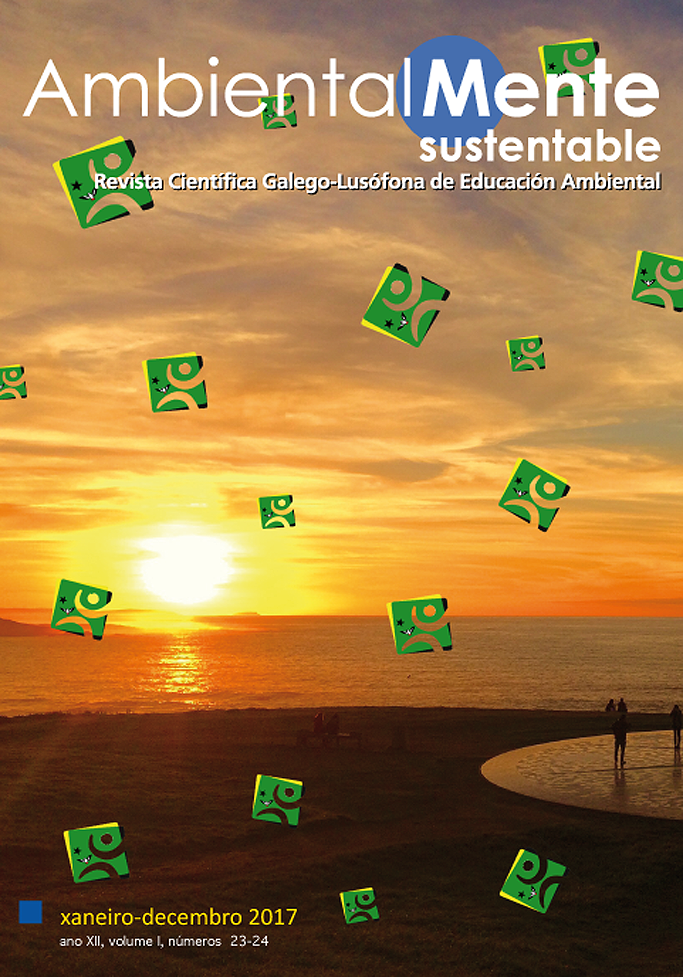Environmental values in the Brazilian Northeast: education for living in the semi-arid region of Pernambuco
Main Article Content
Abstract
Closer the relations between institutions that began to share a geographically delimited area, preparing to preserve their natural characteristics and enable sustainable development is the problem that led to the study whose first results are reported here. The site is known as Fazenda Saco, an area of 3,200 hectares located in the Sertão do Pajeú, administered by the Agronomic Institute of Pernambuco (IPA). Among the beneficiaries of the sharing are the Serra Talhada Academic Unit, the Mata da Pimenteira State Park and the Ivan Souto de Oliveira Settlement. The goal was to outline the cultural and ecological identity of the community of residents of Saco Farm, so that, at a subsequent stage, and based on the values that its members deem important, adapt a training program on the values Cooperation and Respect, aiming at making the relationship culture/environment enriching for all. The action-research method made it possible to identify socioeconomic data and the environmental concern of the community residing at Saco Farm (biospheric, altruistic or egoistic concern). This methodology also allowed us to establish a cooperative relationship between the institutions involved and mutual respect.
Keywords:
Downloads
Article Details
References
Alves, A.R.; Pasquali, L. (2006): “Validação do Portraits Questionnaire- PQ de Schwartz para o Brasil”, In: II congresso de Psicologia Organizacional e do Trabalho.
Azambuja, L.R. (2009): “Os Valores da Economia Solidária”, Sociologias, n. 21, p. 282-317.
Axelrod, R.; Dion, D. The Further Evolution of Cooperation. Disponivel em: http://www.personal.umich.edu/~axe/research/Axelrod%20Dion%20Further%20EC%20Science%201988.pdf, acesso em Agosto de2017.
Cardozo, J.R.A.; Lopes, M.F. (2015): Disponível em: www.caldeiraodochico.com.br/a-importancia-preterita-do-algodao-para-o-nordeste-br, acesso em Agosto de 2017.
Campos, C.B.; Porto, J.B. (2010): “Escala de Valores Pessoais: validação da versão reduzida em amostra de trabalhadores brasileiros”, Psico (PUCRS. Online), v. 41, p. 208-213.
Grunert, S., & Juhl, H. (1995): Values, environmental attitudes and buying of organic foods. Journal of Economic Psychology, 16, 39-62.
Guanziroli, C.; Romeiro, A.; Buainain, A.M.; Sabbato, A. Di.; Bitencourt, G. (2001): A agricultura Familiar e Reforma Agrária no Século XXI. Rio de Janeiro, Garamond.
INCRA, Instituto Nacional de Colonização e Reforma Agrária, disponível em : http://www.incra.gov.br/reformaagraria, acesso em: 20/07/2017, 21-34.
Lopes de Andrade, M. W. C. (2000): A dimensão valorativa do sentido da vida. Dissertação de Mestrado, Universidade Federal da Paraíba, João Pessoa.
Lopes de Andrade, M. W. C..; Lima, T. da S.; Rodrigues, G. F.; Silva, J. L. N. da (2016): “Sociodiversidade, identidade e valores no semiárido”. I Congresso Internacional da Diversidade do Semiárido (CONIDIS), v. 1.
Medeiros, L. S. de; Leite, S.; Sousa, I. C. de; Alentejano, P. R. (2004): Assentamentos rurais: mudança social e dinâmica. Rio de Janeiro, Manual.
Moreira, D. A. (2002): O método fenomenológico na pesquisa. São Paulo, Pioneira Thomson.
Nordlund, A. M., and Garvill, J. (2002): Value Structures behind Proenvironmental Behaviour. Environment and Behavior, 34, 740-756.
Percegona, C. G. (2008): Qualidade de Vida e Respeito ao Meio Ambiente: Artigos Sobre Políticas Públicas para Implantação. Concurso de Trabalhos sobre os Objetivos de desenvolvimento do Milênio.
Sawaia, B. B. (2007): Comunidade: apropriação de um conceito tão antigo quanto a humanidade. Em Psicologia Social Comunitária: da solidariedade à autonomia. S. T. M. Lane, B. B. Sawaia, M. F. Q. de Freitas, P. Guareschi, J. C. R. Nasciutti, N. A. de Vasconcelos & R. H. Campos (Orgs.). Petrópolis: Editora Vozes.
Scopinho, R. A. (2006): “Sobre Cooperação e Cooperativas em Assentamentos Rurais”, In: III Conferência Internacional La Obra de Carlos Marx y los desafios del siglo XXI, Havana-Cuba: Departamento Poligráfico IDICT-Capitólio Nacional.
Schultz, P. W. The structure of environmental concern: concern for self, other people, and the biosphere. Available online at http://www.idealibrary.com on 2001.
Schultz, T.R., Mueller, U.G., Currie, C.R., Rehner, S.A. (2005): Reciprocal illumination: A comparison of agriculture in humans and ants. See Vega & Blackwell 2005.
Schwartz, S.H., (1992): “Universals in the contente and structure of values: Theoretical advance and empirical tests in 20 countries”. In: M. Zanna (Ed.), Advances in Experimental Social Psychology, Vol. 25. San Diego, CA: Academmic Press.
Stern, P., Dietz, T., Abel, T., Guagnano, G. A., & Kalof, L. (1999): A value-belief-norm theory of support for social movements: The case of environmentalism. Human Ecology Review, 6(2), 81-97.
Schultz, P. W., & Zelezny, L. C. (2003): Reframing environmental messages to be congruent with American Values. Human Ecology Review, 10, 126-136.
Tankha, G. (1998): A psychological study of attitudes and awareness towards environmental pollution and degradation. Unpublished doctoral dissertation. Rajasthan University, Jaipur.



